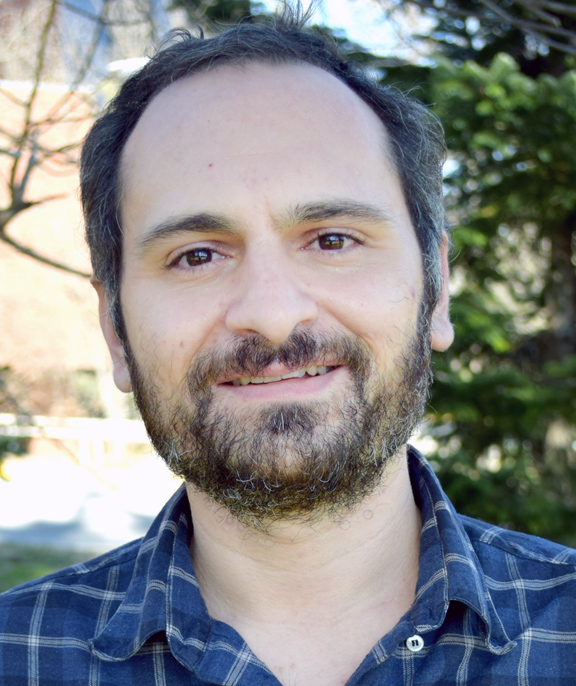
Research Scientist
PhD, Albert Einstein College of Medicine
Email:
matt.sapio@nih.gov
Phone:301-594-4041

Research Scientist
PhD, Albert Einstein College of Medicine
Email:
matt.sapio@nih.gov
Phone:301-594-4041
Dr. Matthew R. Sapio is a research scientist in the Department of Perioperative Medicine. His focus is on the neuroscience of pain and pain control.
Dr. Sapio received his PhD in Neuroscience from Albert Einstein College of Medicine in The Bronx, New York, where he studied peptide processing enzymes with Lloyd Fricker.
He received his postdoctoral training with Drs. Michael J. Iadarola and Andrew J. Mannes in the Department of Perioperative Medicine at the NIH Clinical Center, where his now a scientist.
He has completed studies related to the mechanism and use of the novel non-opioid analgesic resiniferatoxin. He is also deeply involved in transcriptomics and multiplex staining approaches of the nociceptive circuit to understand molecular pain neuroscience in humans.
The emphasis of the DPM Research Program unit is translational research to understand the basic mechanisms of pain and nociception and address clinical pain. Using human and animal tissues, they perform transcriptomic and highly multiplexed anatomical labeling to understand the complement of targetable receptors in the first neurons in the “pain circuit”.
These data enable them to generate hypotheses to improve their understanding of pain and pain control. Their focus in these investigations is the first synapse between the primary afferent sensory neuron in the dorsal root ganglion and the spinal cord. Additionally, they have clinical trials to investigate the safety and efficacy of targeting nociceptive afferents for pain control in advanced cancer and Morton’s Neuroma.
Ma, W*, Sapio, MR*, Manalo, AP, Maric, D, Dougherty, MK, Goto, T, Mannes, AJ, Iadarola, MJ, 2022. Anatomical Analysis of Transient Potential Vanilloid Receptor 1 (Trpv1+) and Mu-Opioid Receptor (Oprm1+) Co-expression in Rat Dorsal Root Ganglion Neurons. Front Mol Neurosci 15, 926596.
Kim, JJ*, Sapio, MR*, Vazquez, FA, Maric, D, Loydpierson, AJ, Ma, W, Zarate, CA, Jr, Iadarola, MJ, Mannes, AJ, 2022. Transcriptional Activation, Deactivation and Rebound Patterns in Cortex, Hippocampus and Amygdala in Response to Ketamine Infusion in Rats. Front Mol Neurosci 15, 892345.
Sapio, MR, Kim, JJ, Loydpierson, AJ, Maric, D, Goto, T, Vazquez, FA, Dougherty, MK, Narasimhan, R, Muhly, WT, Iadarola, MJ, Mannes, AJ, 2021. The Persistent Pain Transcriptome: Identification of Cells and Molecules Activated by Hyperalgesia. J Pain 22, 1146-1179.
Sapio, MR, Iadarola, MJ, LaPaglia, DM, Lehky, T, Thurm, AE, Danley, KM, Fuhr, SR, Lee, MD, Huey, AE, Sharp, SJ, Tsao, JW, Yanovski, JA, Mannes, AJ, Han, JC, 2019. Haploinsufficiency of the brain-derived neurotrophic factor gene is associated with reduced pain sensitivity. Pain 160, 1070-1081.
Sapio, MR, Neubert, JK, LaPaglia, DM, Maric, D, Keller, JM, Raithel, SJ, Rohrs, EL, Anderson, EM, Butman, JA, Caudle, RM, Brown, DC, Heiss, JD, Mannes, AJ, Iadarola, MJ, 2018. Pain control through selective chemo-axotomy of centrally projecting TRPV1+ sensory neurons. J Clin Invest 128, 1657-1670.
Visit PubMed.gov for a full list of Dr. Sapio's publications.
- Invited attendee, North American Pain School, QC, Canada, 2019
- NIH Clinical Center Director’s Award for excellence in research achievements, 2017
- Invited speaker with honorarium, Mitchell Max Award nominee, NIH Pain Consortium, 2016
NOTE: PDF documents require the free Adobe Reader.
This page last updated on 03/17/2023
